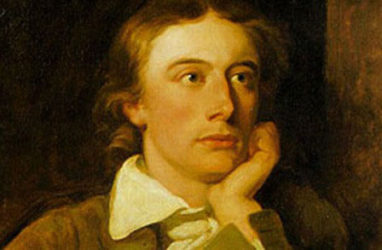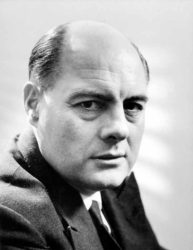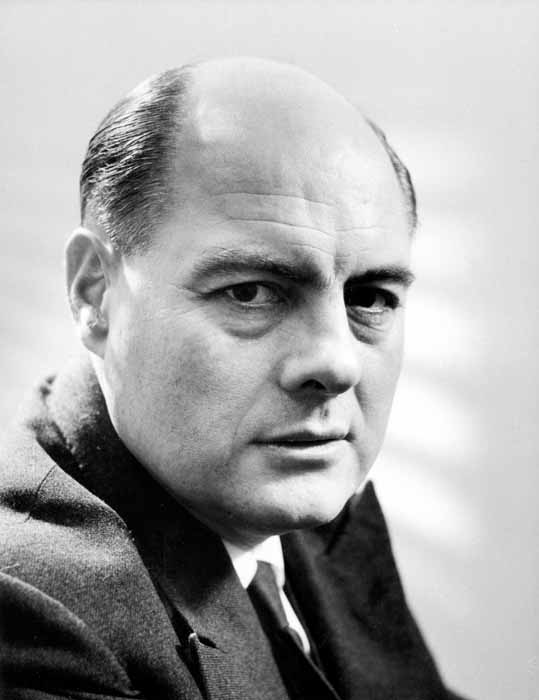Ode To Autumn
Season of mists and mellow fruitfulness,
Close bosom-friend of the maturing sun;
Conspiring with him how to load and bless
With fruit the vines that round the thatch-eves run;
To bend with apples the moss’d cottage-trees,
And fill all fruit with ripeness to the core;
To swell the gourd, and plump the hazel shells
With a sweet kernel; to set budding more,
And still more, later flowers for the bees,
Until they think warm days will never cease,
For Summer has o’er-brimm’d their clammy cells.
Who hath not seen thee oft amid thy store?
Sometimes whoever seeks abroad may find
Thee sitting careless on a granary floor,
Thy hair soft-lifted by the winnowing wind;
Or on a half-reap’d furrow sound asleep,
Drows’d with the fume of poppies, while thy hook
Spares the next swath and all its twined flowers;
And sometimes like a gleaner thou dost keep
Steady thy laden head across a brook;
Or by a cyder-press, with patient look,
Thou watchest the last oozings hours by hours.
Where are the songs of Spring? Ay, where are they?
Think not of them, thou hast thy music too –
While barred clouds bloom the soft-dying day,
And touch the stubble-plains with rosy hue;
Then in a wailful choir the small gnats mourn
Among the river sallows, borne aloft
Or sinking as the light wind lives or dies;
And full-grown lambs loud bleat from hilly bourn;
Hedge-crickets sing; and now with treble soft
The red-breast whistles from a garden-croft;
And gathering swallows twitter in the skies.
John Keats

The BBC has achieved greatness in broadcasting and fully deserves its high reputation for its various services and features around the world. The BBC World Service has established a global reach on which ‘the sun never sets’. It is everywhere and touches on almost everything. Very prominent within this everywhere and everything is poetry. It might have been an agent of imperialism, of the British Empire, but today, it is surely of service to mankind. Its news, documentaries, entertainment and features now serve human rights, justice, democracy, struggling nations and people everywhere.
But of particular interest here is the same service it gives to the arts – to poetry. It is well known the role it played in the rise of West Indian literature through the programme ‘Caribbean Voices’ started by Henry Swanzy. It has featured poems about nature/nature poems, and recently did a feature on ‘The Nation’s Favourite Poet’. In this it did a survey – conducted a popular vote which was won by TS Eliot.

Both these topics – the BBC ‘Poetry Season’ featuring ‘Poems On Nature’, and ‘The Nation’s Favourite Poet’ are relevant to John Keats. Keats was number 9 in the top 10 favourite poets, and the Poetry Season of nature poems featured his poem ‘Ode To Autumn’ as one of the top poems about nature.
John Keats (1795-1821) was also featured by the BBC as “the king of the Romantic Poets”. He had humble and challenging beginnings, and had lost both parents by age 15. He still managed to go to university to study medicine and fulfil his ambition of becoming a doctor. At the same time he had a strong love for poetry and would send his work to others for their comments. Very influential mentors were extremely impressed and he was eventually encouraged to give up medicine for verse writing.
He grew up in the ascendancy of Romanticism and rapidly became one of the main movers of the Romantic Poetry movement in the early eighteenth century. This was a movement that virtually worshipped nature as a major sustaining force, an inspiration and a sanctuary against the rising industrialisation which was threatening the conservation and purity of the countryside. The Romantics fought against human exploitation and supported the philosophy from Europe (France) revering “liberty, equality, brotherhood” (the liberté, égalité, fraternité of the French Jacobins). They also supported the free flow of human feeling, expressed through poetry.


